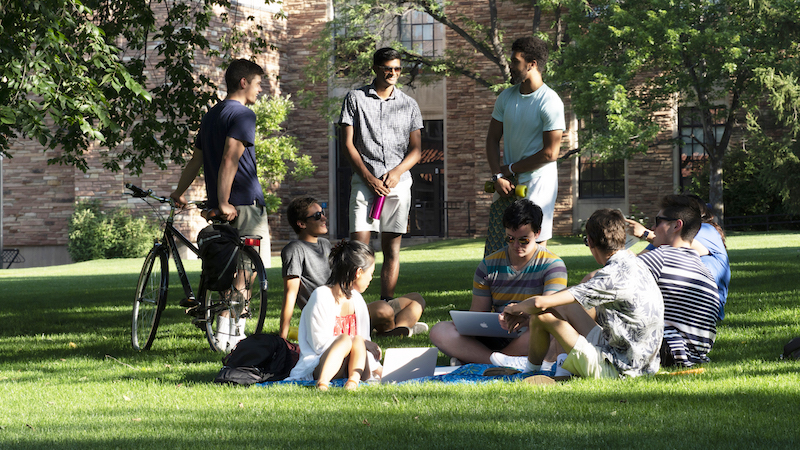
Get stories and expert advice on all things related to college and parenting.

Prior to 2020, most of us associated the word “hybrid” with vehicles or plants. According to the Merriam-Webster dictionary, it is an adjective used to describe something “that has two different types of components performing essentially the same function.”
Over the past decade, hybrid began to be used to describe a blended approach to delivering courses in a higher education setting, with schools combining face-to-face instruction with online activities. Many college students are already familiar with the concept when it comes to academics.
But when fall rolls around this year, students heading off to college for the first time will experience hybrid in a whole new way, as colleges and universities across the U.S. blend old and fresh elements for every aspect of campus life.
It may be awhile before huge lecture auditoriums are once again packed to overflow with students. Look for innovative ways that large classes will be sectioned into smaller groupings:
Basically, alternating but parallel experiences will likely become the norm at many schools.
Schools are all busy working on ways for students to live together, but with practices that promote and protect health and safety.
Some students may be asked to self-isolate for a period of time during their first year if they exhibit symptoms of illness or to wear a mask whenever they are in a dorm room with more than a few other people. Temperature checks, hand sanitizers, and location-sharing apps will likely become daily rituals for many students, at least for their first semester, two quarters, or entire year of school.
Dining halls and on-campus eateries will adapt in the way that most restaurants have, with more take-out options, extra prepackaged meals and snacks available, spread-out seating and elevated cleaning protocols.
Depending on a school’s location and size, gatherings may be limited to a certain number and many more events and meetings will be carried out on digital platforms.
Students may be joining clubs and organizations entirely online or may be told they'll have to wait until second semester for a more traditional experience. Watching a school’s teams participate in athletic competitions may be a virtual or partially limited experience for a while.
No matter what a new college student will encounter in the fall of 2020, they'll need to embrace a mindset that includes three key concepts relating to this hybrid lifestyle.
Rules, guidelines and suggestions will be constantly evolving with emerging scientific and economic realities. We will need to discuss with our kids the importance of embracing a fair amount of adjustment, perhaps as often as on a weekly basis.
They've gotten used to modifications and substitutes, and we can assist them in re-framing disappointments over to accepting challenges as an adventure that will only help them throughout college and into the future.
There will be delays. There will be lines — appropriately distanced. There will be frustration and sometimes there will be anger. Some rules will seem logical and others simply annoying. But if students start their academic year acknowledging these challenges, and knowing they are mostly temporary, they will move through them much more easily.
Without a doubt, students will encounter others who may have a different attitude about degrees of social distancing and adhering to recommendations from their college administration or their state and local governments.
This is a fact of life with all large groups of people anywhere. Respecting boundaries and keeping in mind that personal health is a sensitive issue will serve all of our students well.
This class will begin to swiftly feel how bonded they and their new classmates already are from day one of stepping onto campus in the fall of 2020. They all experienced a life-altering senior year of high school like no other class in many decades. Every single one of them can emotionally relate to each and every other freshman they will meet.
They will share stories of loss and pain and grief. They will arrive with abundant empathy for one another and a strong willingness to help each other out. Because they all know what it’s like to feel scared and unsure about the future. They’ve all experienced days where they didn’t want to get out of bed, or they screamed in frustration over one more cancellation.
The reality is that even in a “normal” year, starting college can be daunting with all of the many unknowns that new students must grapple with: feeling homesick, getting lost, and struggling with difficult classes. This year they won’t be able to rely on accounts of how freshman year went for their older siblings, alumni they might know, or the current students they’ve talked to in person during a campus visit or the ones they may have watched online in a promotional video.
Instead they will rely on each other, and forge ahead as a unified cohort, having already shown just how resilient they are. Onward and upward will be their battle cry.
The hybrid college experience of 2020 will be novel, just like the tiny particles that spread quickly to change our world. But this class of incoming freshmen will acquire a skill set and a mindset that is novel as well — and they will undoubtedly change our world for the better.